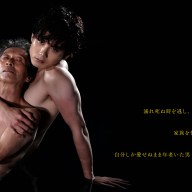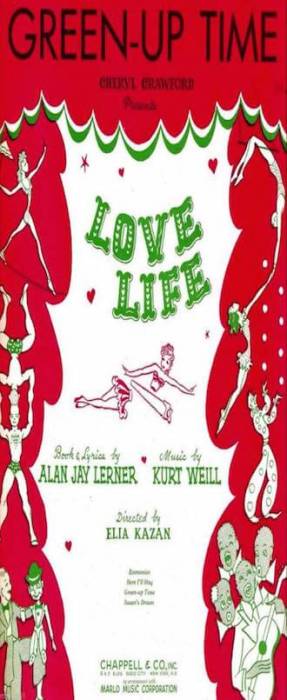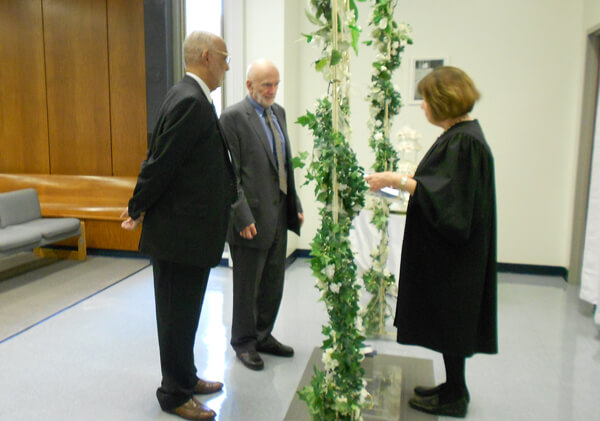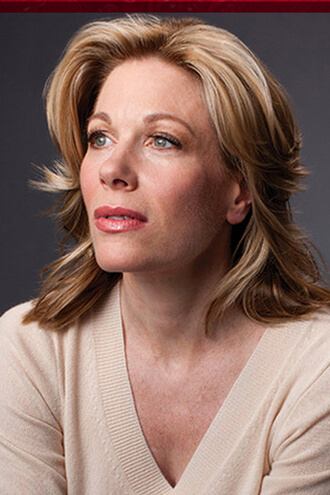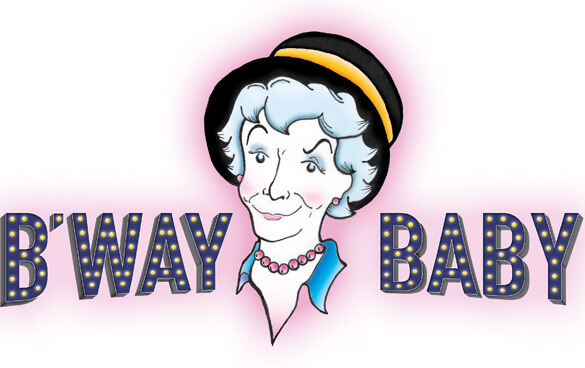Orville Mendoza at the Hudson Diner. | DAVID NOH
Forget all the hype about that certain former bathhouse diva turned megastar now returning in a warhorse vehicle to tumultuous ovations and lotsa ka-ching, the best show opening this spring is another revival — of Stephen Sondheim’s “Pacific Overtures,” presented by CSC and brilliantly directed by John Doyle.
The slightly insane m.o. of this show back in 1976 was to tell the history of Japan in modern times, presented in Kabuki fashion. It has been scaled down considerably, in terms of length, cast, and production (minimalist and utterly exquisite, with the most evocative lighting I’ve seen in years).
Result?
The very best version of this unwieldy, problematic, and spottily brilliant show I’ve ever seen. Gorgeously orchestrated for an 11-member orchestra — actually two more pieces than were in the last Broadway revival — Sondheim’s music thrills you to the marrow and cast members not only each get their individual moment to shine, but, in the process, make you seriously fall in love with all of them.
A blinding Asian talent in “Pacific Overtures,” with the 411 from Sulu, too; a longtime musical theater team
Orville Mendoza, who plays Manjiro, the first Japanese to venture to America and then return to warn of the outside world’s encroachment, is an actor I’ve admired him since first spotting him as a joyously flamboyant drag queen, Tempura, in Christopher Durang’s campfest, “Adrift in Macao,” in 2007, sumptuously dressed by the late and quite fabulous Willa Kim. Since then, in role after role, this true character guy has impressed me with his limitless versatility and utterly irresistible, sheer performance joy.
The show, itself, ordinarily runs two and a half hours with intermission.
“Ours is 90 minutes, no intermission,” Mendoza smiled, meeting me at the Hudson Diner. “There have been major cuts. This is my third show with John Doyle. In Sondheim’s ‘Road Show,’ I played a Jewish character, and in his ‘Passion,’ I was Italian, so it’s nice to finally play an Asian here! When John does revivals, he is not interested in recreating or making a museum piece. He really wants to investigate and see what it is now. He worked in tandem with [book writer] John Weidman all through rehearsals, and the cuts are also run by Sondheim, of course. The original impetus of the show back in 1976 was to explore the notion of how you could tell the musical story of the opening of Japan through Kabuki.
“So that’s already been done. This new frame is very Brechtian, and John makes no bones about his techniques being just that: he wants the audience to know that we are just storytellers, not these actual historical people come to life. We do it in modern dress, with a few authentic Japanese items, to suggest kimono and other things, but very few to suggest time and place. John is more interested in what theater can do, as opposed to film, which is very literal. He says, ‘Film can tell a story very literally, and there is no way, even with the biggest budget, that theater can compete with that.’
“What theater can do that is better than film is tap into people’s imaginations. It’s like reading a book: the reader engages with the author but they also create images in their mind. That’s John’s technique: he wants the audience to come halfway there. He’s never going to get 100 percent of the people enjoying his work, and he loves the fact that you either love or hate it. He does not want middle of the road.
“As far as critical opinion goes, John says, ‘Eh! I could take it or leave it.’ He almost wants people to be angry like — ‘Why did they cut [the song] “Chrysanthemum Tea?”’ I don’t think it’s a secret to say that; we’re not pulling the wool over anyone’s eyes. No, you’re not going to see that song if you watch our version of the show. Sondheim, Weidman, and Doyle decided that, and you will see that it did not fit the way we were telling the story now.
“It’s just so exciting to work on a piece where the authors are still alive. When I first met Sondheim, I said, ‘Mr. Sondheim, this is such an honor,’ and he said, ‘Uh, call me Steve.’ He likes to be one of the guys and doesn’t do well with all the fawning. He’s very gracious and really down to earth, and loves passing on what he’s learned to the next generation, so generous with his wisdom. Even if it’s a lame question about a song he wrote, he will give full attention to it and answer.
“He trusts John Doyle implicitly and left a note for us on our first day of rehearsal: ‘Do everything John says.’ Like John, he doesn’t give much credence to critical acclaim. On ‘Road Show,’ he took out everything Sam Mendes and Hal Prince had added to the script: ‘This is the show.’ Ultimately you have to do it for what you get, artistically. He doesn’t need another hit to make him relevant. I admire how he looks at pieces, trying to discover new things in them.”
Mendoza is Filipino and hails from Victorville, California, “in the desert on the 15, going towards Las Vegas. My parents — Dad a retired medical technician, Mom an accountant at the same hospital — are very religious, and are both elders in the Church of Latter-day Saints. I went to private Adventists schools all through grade and high school, where theater was frowned upon and you would go to hell if you were an actor. Music has always been a part of my life, but it wasn’t until I got to college that I started flirting with theater.”
When Mendoza told his parents he was changing his major to theater from pre-med, they said, “Oh no! You’re going to be a doctor!”
But he told them, “‘There are so many kids in my program that actually want to be doctors that there’s no way I’m going to waste your money and my time.’ It’s such an Asian cliché, right? They said, ‘How are you going to make money?’ I said, ‘I don’t know, but I think it’s going to be okay.’ And right after graduating school, I got the national tour of ‘Miss Saigon.’ Once they saw I could make a living at this, they calmed down, but they’re still not thrilled about me not going to church or observing the Sabbath — which Adventists do, the same way as Jews. Or being gay, that’s another religious issue with them. But they see that I’m happy and living life to the fullest.”
Regarding his being gay, Mendoza said, “I think I rather underestimated them. I’m middle-aged now, but didn’t come out to them until I was in my early 30s. My Dad had had a stroke and, while I was driving to visit him in the hospital with my Mom, I decided to tell her that Brian [Myers Cooper], whom I’ve been with now for 10 years, was not just my roommate, but my partner. She said, ‘I know.’ I added, ‘I’m gay, and Brian and I love each other.’ She said, ‘I know.’ Then I said, ‘I know I didn’t tell you for a long time because I didn’t want to make you choose between your son and your religious beliefs.’
“She really surprised me when she said, ‘You know what? That’s between you and God. My job is just to love you as my son.’ I had really thought they would not have that and would disown me. But looking back, I see that it was about that particular time, with my Dad not well, when you realize what’s important.”
After seeing Mendoza being absolutely brilliant in Lloyd Suh’s 2015 “Charles Francis Chan Jr.’s Exotic Oriental Murder Mystery,” along with cast mates Jennifer Ikeda, KK Moggie, Jeffrey Omura, and Peter Kim, it really struck me that, despite myriad setbacks and seemingly eternal offensive casting vagaries — Emma Stone cast as a Hawaiian, for one — we are nevertheless now living in a kind of Golden Age for Asian actors, with an escalating visibility of varied and highly impressive talent in film and TV and, especially, on the New York stage.
“Did you see Qui Nguyen’s ‘Vietgone?’” Mendoza asked me. “It was the story of a father’s experience in Vietnam, and beautifully done, spoofing ‘Miss Saigon.’ Hopefully, more changes like that are coming, with greater opportunities for us. Yellowface was prevalent when ‘Flower Drum Song’ and ‘The King and I’ were originally produced, because it was hard to find trained Asian actors. Times have changed, and there are now so many actors coming out of Ivy League schools with impeccable training, and it behooves playwrights to write for them.
“But we shouldn’t rely on Caucasian writers to tell our stories. Producers need to get behind Qui, Suh. Christine Toy Johnson is writing musicals for us. It’s not enough to just produce one Asian show, which may have flopped, discouraging any future efforts. You need to cultivate an audience for them. I get it — you gotta sell tickets, but, for example, CSC is trying to appeal to a younger audience, because, frankly, their audience is dying out and how many years can you just appease the same patrons? I do know that I would never want to be an artistic director.”
Besides playing The Engineer in ‘Miss Saigon,’ Mendoza has also been in that other Asian rep warhorse, “The King and I,” with Shirley Jones and John Saxon.
“I played Kralahome — you know, the one who always comes in with the bad news: ‘She is dead! And her lover is dead, too!’ It was amazing — my first Equity contract — and Shirley was fantastic. Maybe it took her a while to get to the note but when she hit it, it was glorious! Her sons were beautiful, and they all came to see us when we were in Detroit. They played tunes on the piano in the hotel lobby.
“When we were in St. Louis and Detroit, we were able to find Asian kids, but in Atlanta! We had this one beautiful baby girl, blonde as could be, with a huge Southern accent: ‘Mrs. Anna! Do not go away! We all are in great need of you!’ This is why we need to nurture Asian kid actors!”
Mendoza also played the notoriously stereotypical houseboy, Ito, in ‘Mame,’ with Michele Lee, no less, at the Muny Theater in St. Louis, and I wanted to know how an Asian actor goes about trying to invest this stock, pidgin-English speaking, tittering racial cliché with some human dignity and truth.
“Sadly, we only had a week and a half rehearsal, very summer stock, but she was a wonderful Mame, and we also had Ruth Williamson, who was fantastic as Vera. With Ito, it was really a question of dealing with the accent, which you never want to be the joke. Accents are always helpful — they tell you where a character is from. Ito was in America, making a living, and is more multidimensional in his devotion to Mame. They are friends — he is her confidante. He will tell her what’s up, but he is not just her servant. She thinks of him as a loyal friend who really wants to help, and the bond between them transcends the usual employer-employee relationship. To me, that’s the only way to approach it.”
Mendoza lives in Harlem with Cooper, unmarried — as yet — and their “fur baby” and no plans for any other children.
“I’ve loved all the opportunities I’ve been given — the New York City Ballet even hires me to sing ‘West Side Story’ selections when they dance to that music, and I’ve even been on tour with them. But none of it is super high profile. I don’t often get articles written about me.
‘I’ve always been a character actor, and was never in competition for the same roles as Paolo Montalbán or Jose Llana. I always wanted to prove myself to my parents, but all they knew about actors was ‘The Love Boat.’ No, I wanted to do Shakespeare in the Park and musicals, which I have done, to prove that I’m a serious artist and not just in it for the money or quick fame.
“It’s fun getting recognized occasionally, but I’m a very private person. I don’t want to walk out of a porn shop and hear, ‘Oh, Orville!’ I want to be able to walk into a porn shop, pick up my supplies, and walk out proudly!”
PACIFIC OVERTURES | Classic Stage Company, 136 E. 13th St., btwn. Third & Fourth Aves. | Through Jun. 18: Tue.-Thu. at 7 p.m.; Fri.-Sat. at 8 p.m.; Sat.-Sun. at 3 p.m. | $71 at classicstage.org/season/pacific-overtures
George Takei and David Noh at the May 7 Lucille Lortel Awards. | DAVID NOH
At the always fun and deeply enlightening Lucille Lortel Awards, on May 7 at NYU’s Skirball Center, I ran into Mendoza’s cast mate, George Takei, who has now become like everyone’s favorite uncle. He seconded Mendoza’s praise for their show: “It has everything to do with John Doyle’s signature on it. I saw the 1976 production and while it was spectacular, it certainly wasn’t as elegant, clear, or poetic as this production. I call it ‘theatrical haiku,’ because haiku is suggestion building toward a central idea: the breeze/ scented with cherry blossom/ my heart.’ And that’s what he does in the first half, which is elegant, courtly, stately, and pure, in classical Japanese, because it’s been so isolated. But the second half, when America comes, is absolute chaos, but it’s so much fun. ‘Please, Hello’ and that sets the cultural contrast. And that wonderful Sondheim music — our 11 musicians I think are more effective than the 30-piece orchestra they had on Broadway back then.”
Though known everywhere for Sulu on “Star Trek, Takei confessed, “Theater is where my heart is. I love it. How do I stay so young? Last week I turned 80, an octogenarian in my ninth decade. I enjoy and live life with passion and optimism. Diet-wise, I eat mostly fish and poultry, lots of fruit and vegetables. I exercise every day. My husband, Brad [Altman, in faithful, humorously wry attendance] and I are bicoastal. My principal home is LA. That’s where my heart is, particularly in winter or summer. If you see me here in those months, you know I’m being paid to be here.”
If the challenges of retaining every lyric in “Hamilton” or keeping up with repetitive plot of “Groundhog Day” are too much for you, you can go to the York Theater and cozy up to “Marry Harry,” a winning little sweetheart of a show (see David Kennerley review). It’s about a pair of unlikely lovers, an East Village wanna-be gourmet chef (David Spadora) and an upper East Side princess (Morgan Cowling, lovely) who’s just called off her wedding, and his guilt-laying, trend-obsessed – but really old school – Dad (ever delightful Lenny Wolpe) and her snooty, domineering mother (a winningly strong Robin Skye).
The show’s tuneful, catchy music and lyrics were written by the real life couple of Dan Martin and Michael Biello, who are also two of the brightest, sweetest guys I’ve ever met. It’s always inspiring for me to meet gay men who can successfully sustain a long-term relationship over a period of decades, and the fact that they are artistic collaborators seems even more challenging.
Dan Martin and Michael Biello. | DAVID NOH
“It’s been 41 years,” Martin said. “Whew! It flew by. We met when we were both modern dancers in a workshop in Ohio in 1975. Michael [who also has a successful art career as a sculptor] really showed me how to be an artist. Our collaboration runs along the lines of discussing what we want to create, and Michael will start writing the lyrics. He reads the words aloud to me, and I set them to music. I play him what I’ve got and there’s more discussion, with the result of him doing more writing and me composing, usually.”
Their impressive body of musical work, which began when Biello shared his journals with Martin, who set them to music, has been unabashedly out and proud, starting with their first musical, “Breathe,” in 1992, which addressed loss during the AIDS era at its most virulent, now soberingly relevant again in the wake of last year’s Orlando shooting. “Xposed” was a concept musical set inside a male burlesque theater. “In My Body” Biello described as a “musical about the journeys we travel to find home in our own bodies,” but the winsome “Marry Harry” is a definite paradigm shift for them, being completely heterosexual in its boy meets girl story (although two of three member Greek Chorus seemed a little fabulously light in their loafers).
Biello sees it “as a love letter to New York, where we both have lived–- Philly is just easier for us, after having moved there to take care of family. But everyone in this city – any city – wants to find love, basically, so it’s a universally relatable story, I think. Make sure you have a good meal planned before or after the show. It is sure to make you hungry, there’s so much food in it!”










